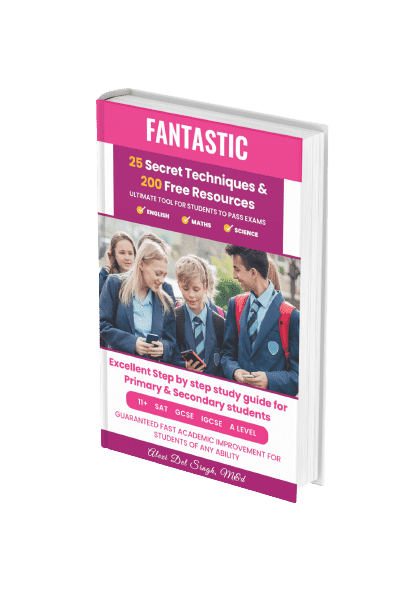Preparation for GCSE Exams
Over the years, GCSE exams have seen considerable evolution in paper patterns and preparation techniques as well. Achieving high grades requires utilising expert guidance and valuable resources during your preparation.
At EMS Tutoring, we offer thorough lessons, expert notes, helpful videos and audio materials to ensure you perform well in your exams.
In this blog, we will help you out on how to do revisions and preparations for GCSE exams.
Right Time to Initiate Preparations for GCSE Exams?
The right time to begin revising for GCSEs is now. Don’t wait for a specific moment, make it a daily routine. Learning the material is one thing, but keeping it fresh in your mind is another. This is why having a regular revision timetable is crucial, and it’s best to start early.
It helps you manage your schoolwork and revision well and gives you plenty of time to understand your learning. This guide for GCSE preparation will teach you how to begin with the fundamentals.

How to do Preparation for GCSE Exams?
Be Organised
Preparing for your GCSEs is more than knowing when your exams are. It’s about organising everything, which will be a big achievement for your future self.
Being organised helps you think clearly and stay focused. You should keep your study notes organised by subjects and in one place. Create a clean and distraction-free study area and keep it neat.
To use your time and study effectively, make a schedule that matches your exam timetable and write it down. Writing it down helps you remember it. This way, you will know which subjects to focus on first and where to concentrate based on the order of your GCSE exams.
Health is Priority
Taking care of your health and getting good-quality sleep might not be your top priority, but it will make you feel more prepared and relaxed.
Concentrating and learning when you are tired is tough, so getting a proper night’s sleep is vital. It means going to bed, waking up at reasonable times, and sticking to a routine. Even though it’s tempting to stay up late watching Netflix after exams, remind yourself it is only for a short time, and you want to give yourself the best chance to pass your GCSEs.
Maintaining a healthy diet and staying well-hydrated is important for your well-being during this period. Even if you are inactive during exams, your brain works harder than ever. Have you heard the term “brain food”? Ensure you give your brain the proper nutrients to cope with fatigue, stress and other exam-related challenges.

Effective GCSE Revision: Strategies and Approaches
Before studying for your GCSE exams, it’s essential to understand the art of effective revision and tailor it to your personal learning style. To do this, you should determine which revision methods suit you the best. It means matching your study techniques with your personal way of learning.
Your “learning style” refers to your preferred way of absorbing, processing and comprehending information. Understanding your learning style enables you to adjust your study techniques for better effectiveness. Three primary learning styles are visual, tactile and auditory. Each of these styles goes well with specific study techniques. Utilising these methods will aid you in maintaining concentration in studying.
Visual Learning
For visual learners, the most effective way to learn is by observing visual information. Your comprehension and ability to memorise information improve when it is visually presented. As a visual learner, you might find these study methods helpful:
- Highlight and use colours in your notes.
- Make charts, flowcharts and mind maps to remember important information.
- Create and use flashcards.
- Study texts with pictures and diagrams.
- Create storyboards to review processes or events, especially for subjects like Science, History and Geography.
Tactile Learning
Tactile learners excel in their learning when they are actively engaged in hands-on activities. They learn and retain information through direct experience. As a tactile learner, these study tips are for you:
- Move around while you study – fidget, chew gum, or walk around the room as you go over your notes.
- When you write on large sheets of paper or whiteboards, it provides a more tactile experience, making you feel actively engaged as you write.
- Try simple experiments related to your subjects, especially for subjects like Biology, Chemistry and Physics.
- Watch live demonstrations related to your subjects.
Auditory Learning
If you are someone who learns best by listening and talking. You understand and remember things by hearing them. If you are an auditory learner, these study methods will be great for you:
- Hear podcasts or online lessons relevant to your subjects.
- Utilise memory tricks like acronyms, rhymes or songs to recall crucial information.
- Share your knowledge by teaching others; create lesson plans about your subjects and instruct your friends or family.
- Read your notes and textbooks aloud, or consider yourself recording for later listening.
- Share your knowledge by teaching others. Create lesson plans about your subjects and instruct your friends or family.
- Say your answers out loud before you write them down when doing practice tests.
You can combine and use methods from various categories if you don’t fit neatly into one of these styles. The important part is finding what works effectively for you; there is not a single correct or incorrect way to study.

Maximise the Benefits of Online GCSE Resources
Now that you know how to prepare for your GCSEs, it’s also important to use online resources effectively. Reviewing your class materials is a good start, but you must do extra research, reading and practice for your exams. There are many revision websites online, which can be overwhelming, especially if you have multiple exams in different subjects. Here are the steps you can take to fully utilise these resources:
Understand Your Exams
First, determine which exam board is responsible for your GCSE exams in each subject. Visit their websites and get familiar with the syllabus and course details. This will assist you in structuring your study and identifying areas that require extra attention.
Use Examiner Insights
Exam board websites often have past papers, making guides and reports from examiners. These are valuable because they provide insight into what the examiners are looking for. You can:
- Look at the marking guides and example answers to understand what the examiners expect.
- Practice past papers under pressure to improve your memory and understand how questions are asked. You can ask a parent, teacher or tutor to help you.
- Read examiner reports carefully. These reports explain how students performed in past exams and what worked or did not. It’s a goldmine of tips.
Practice and Improve
If you find gaps in your knowledge or need to understand a topic better, use other revision websites. Look for ones that match your exam boards or search for topics you are studying. This ensures that you are obtaining useful information that helps in your preparation.



